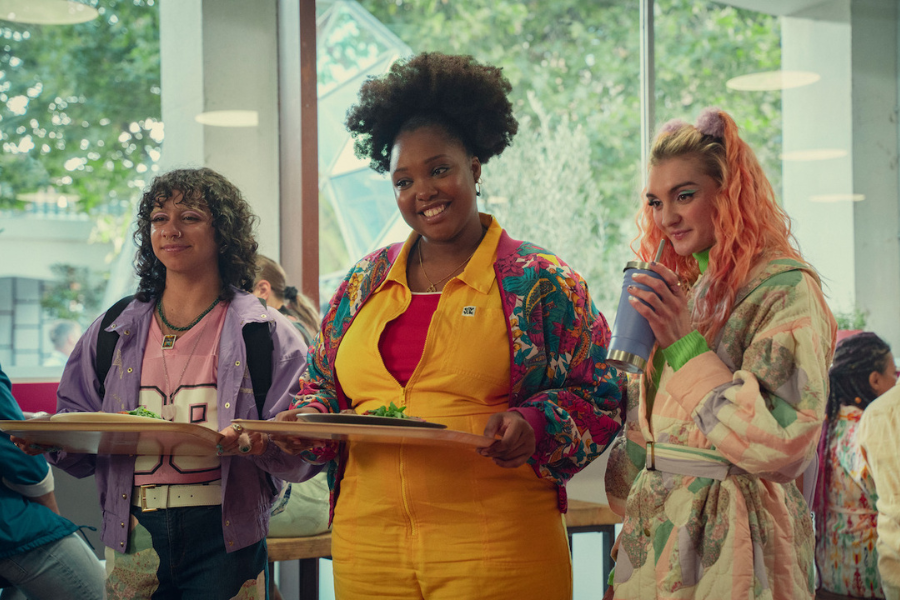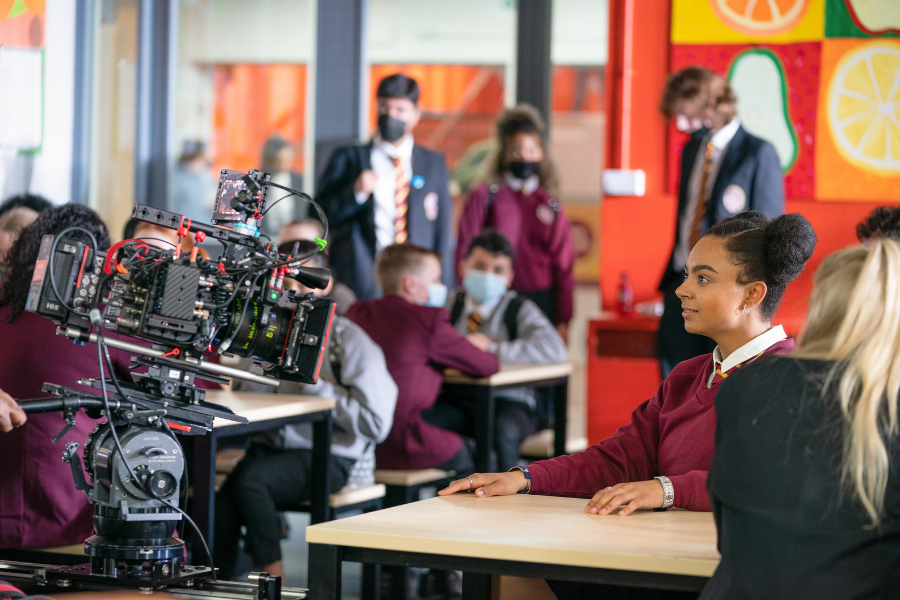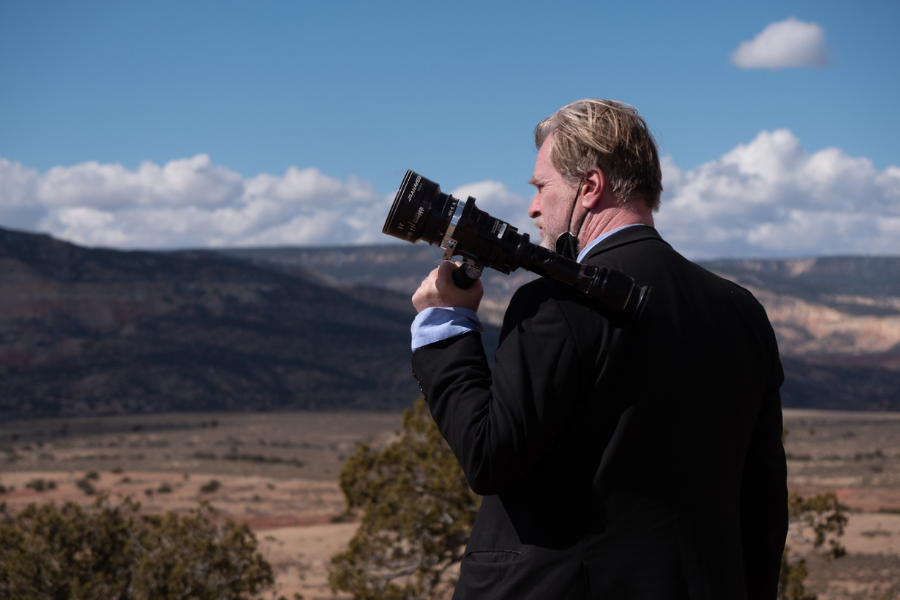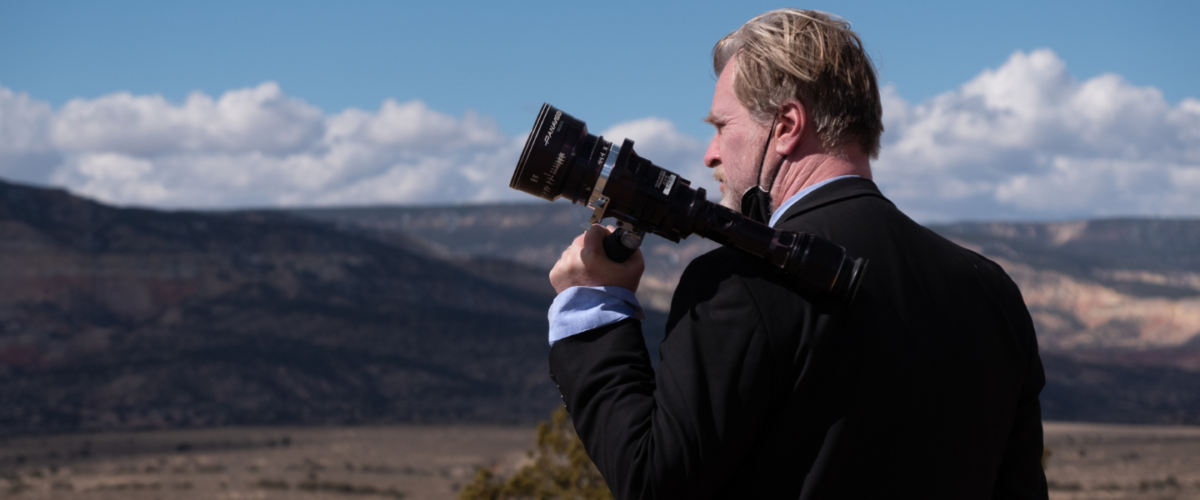December 2, 2024
If we had a penny for every time someone said they wanted to be a Director, we’d sure have a lot of pennies. And it’s really no surprise that’s the case. Being a Director is by and large, a very cool job; a chance to captain your own creative vision. Actors notwithstanding, Directors are probably the most recognisable figure attached to a project, actively promoting their work by way of interviews, conversations and masterclasses galore. In short, Directors get a lot of exposure, and as a result, we’re well versed in what they do – which may account for why the job remains the number 1 coveted role amongst new entrants. There’s something fundamentally familiar about the ‘Director’, and it’s a safe bet we can reel off a good number of them by heart. It’s a bit of a different story when it comes to Gaffers. Or Production Designers. Or Casting Associates. Or the hundreds of other roles integral to making the Director’s vision a reality. The truth is the film and TV industry offers a multiplex of job opportunities – from camera to costume, accounting to art, script to special effects and beyond. There is, quite literally, a job for everyone. And crucially, a job for any experience level. The number of career options are staggering, and perhaps at first glance, somewhat overwhelming.
When faced with so many options, it can feel like choice overload. Thinking about your career can also lead to anxiety and worry about making a potentially incorrect decision. And with such a lack of contextualised knowledge surrounding job opportunities and career progression in Film & TV, it’s no wonder that nine in ten working-class parents would advise their children against working in the industry, preferring them to instead pursue more ‘stable’ careers in law, finance and IT [Netflix & the National Youth Theatre]. And, look… Film & TV does have a certain unpredictable quality. It is shaped by changing trends, economic cycles and unforeseen challenges. But its resilience remains undeniable. And at Filming in England, we firmly believe that the key solution lies in raising greater career awareness. In clearly outlining job descriptions, guiding young people through career pathways, and encouraging both parents and their children to think outside the box when it comes to career opportunities.
So, welcome to the weird and wonderful world of Film & TV – we tend to do things a little differently, here. To provide a deeper insight into the vast range of career opportunities, I spoke with several industry professionals from different departments. Each of them has carved a unique path whilst navigating the challenges of the sector. They share the skills they’ve honed and valuable advice for anyone looking to break into the industry. Whether a newcomer eager to learn, or a seasoned creative looking to shift focus, their experiences offer invaluable perspective to what it takes to thrive in Film & TV.
Did you know?
Christopher Nolan (Oppenheimer, The Dark Knight Trilogy) studied English Literature instead of Film at university, believing a more developed understanding of storytelling would aid in his goal of becoming a Director.

Production
“Although we’re not where the action is, without us the action wouldn’t happen.”
One of the most high-demand roles in the Production department is that of the Production Coordinator. As most people working in the industry would tell you – Coordinators are the backbone of a production. They act as a central point of contact for all departments on set, ensuring that communication flows smoothly and that every part of the production is running on time and within budget. They are, quite simply, the go-to person for managing logistics and keeping everything organised behind the scenes. The demand for skilled Production Coordinators continues to grow, making it a vital and exciting career path within the industry. ‘It takes a certain type of person to be a Production Coordinator as it involves both organisation and creativity,’ says North West based Production Coordinator Keely Milovsorov. Keely, who has coordinated projects such as the global smash hit Peaky Blinders and BBC’s Time, told us:
“Often the skills to work in the Production Office are more personality based than things you can learn, but if you enjoy working at a fast pace, with ever changing priorities as well as maintaining great attention to detail (as there is A LOT of admin) this is the role for you. Coordinators need to be affective communicators as they filter all information to the crew. The great thing about Coordinating is that you have an overview of the whole filming process from start to finish and you often get perks like free hotel stays, and you are responsible for organising the wrap party. My favourite is coming up with solutions when things go wrong, and it needs to happen NOW! The main crux of the job is the distribution of daily information as well as a lot of legal stuff like clearances as well as contracting cast and crew – so it’s a big responsibility.”
While there are various pathways into production coordination, several entry-level production roles offer a smooth transition into the field. “I would suggest start as a Rushes Runner or Production Runner,” says Keely. “You can also side-step from the Sustainability Assistant job as they work closely with Production. But note that we are office and not set based, and although we’re not where the action is, without us the action wouldn’t happen.”
Accounting
A department that offers a similarly structured, office-based setting is Accounting. This is one area in Film & TV that has long suffered from a major skills shortage, and the demand for financial and mathematics-savvy professionals has only grown since the COVID pandemic. Despite its reputation for being less glamorous than some of the more creative jobs, it plays a crucial role in keeping productions running smoothly. The industry desperately needs skilled individuals who can manage budgets, handle payroll, and navigate complex financial systems. Will Marwood, Production Accountant for Amazon’s Upgraded, CBBC’s The Worst Witch and ITV’s The Confessions of Frannie Langton told us:
“Production Accountancy is the term used to cover a wide range of duties that are vital to the proper functioning of a TV or film, but it’s not ‘proper’ accountancy and it’s not ‘proper’ production; the accounts office remains a sanctuary of calm rational thought, one step removed from the frantic production office, but still fast-paced and informal like all desirable media jobs should be.”

Working in Accounts offers a fantastic and often underappreciated gateway into the industry. It provides an excellent opportunity for those with a passion for numbers to build a solid career while being at the heart of the production process. So, what might you expect from a typical day?
“The work offers a delightful blend of regular weekly routines, running payrolls, paying suppliers, cost reporting with Heads of Departments and Producers etc and ad-hoc tasks, explaining how the UK tax system works, interrogating petty cash receipts and occasionally providing bundles of actual money to be used on camera.”
Accounting could be perfect for individuals who thrive in a detail-oriented and methodical work environment. Like the Production Coordinator, the role of the Accountant requires several hard and soft skills working in tandem. A formal qualification in mathematics, finance or business may be beneficial when looking for entry level accounting positions. Because, although Will emphasises that it isn’t strictly ‘proper’ accountancy, accounting principles must still be adhered to. “The main skills needed are patience, tolerance and a mild sense of numeracy. The function of Production Accounting flows up, down and across the whole range of a production, from Producers to Cast to Location Marshals, so flexible communication is the main vital ingredient.”
Access
Leaving the production office behind, we now shift focus to a relatively new area within Film & TV. Whilst traditionally, many of the industry’s behind-the-scenes roles have focused on the logistics and financials of production, the growing demand for diversity, inclusion, and accessibility has paved the way for new careers aimed at ensuring that everyone – regardless of ability – can participate in the creative process. As the film and TV industry continues to evolve, so do the roles that help create a more inclusive, accessible, and supportive workplace. One such role that has recently gained prominence is that of the Access Coordinator. According to leading deaf, disabled and/or neurodivergent creative arts organisation TripleC, the Access Coordinator, or the ‘AC’, should be brought on in the early stages of the production to assess the working environment, ensuring adjustments are in place. But what exactly do they do? “In short, an Access Coordinator provides on the ground expert advice and support as well as helping to signpost, guide and oversee the production team to make sure each office, studio and location is as accessible as possible,” says Sara Johnson, Agent and Access Consultant at Casarotto Ramsay & Associates.
The tasks of an Access Coordinator can vary based on a production’s budget and timeline, and ACs may be part time or full time, work remotely or based within the production office, studio, location, or edit suite. A key aspect of the role is ensuring that all deaf, disabled, and/or neurodivergent (DDN) cast and crew members can safely disclose their access requirements, so they can perform their work without barriers. Julie Fernandez, experienced Access Coordinator and agent/trainer at Casarotto’s Access Team explains:
“The AC begins by sending an introductory letter to all cast, crew and creatives on production to explain the role and how it can help. We do this because despite it being nearly three years since I first called myself an AC, many people have still not worked with one. We encourage anyone who has disclosed, and anyone who might want to, to arrange for a 1:1 chat where we discuss their relevant access requirements. This is then sensitively shared with the relevant production department. The AC is there to help guide and oversee any accommodations being made.”

The AC must remain an active presence at every stage of the production process, available to address any questions from across departments. So, when it comes to skills and experience, what exactly are productions looking for? Well, ACs will have a lived experience of being deaf, disabled and/or neurodivergent, and possess a strong understanding of access, disability rights and access provision networks. Since a key part of the role involves liaising with cast and crew, strong communication skills are essential, allowing individuals to feel comfortable disclosing personal and sensitive information. Adaptability, planning, and problem-solving abilities are also highly valued.
Whilst the Access Coordinator role is relatively new, it highlights the industry’s growing commitment to improving best practice. Organisations like The TV Access Project, ScreenSkills and Triple C provide valuable career resources, including detailed AC job descriptions and training opportunities. If you are passionate about helping others and committed to supporting accessibility efforts across the industry, this could be a rewarding career path to explore.
Casting
Having explored the importance of accessibility, we now turn our focus to the Casting Department, which offers its own unique and exciting career path. Unlike the more behind-the-scenes roles in Accounting, Access and Production, Casting requires a keen eye for talent, an understanding of character dynamics, and strong interpersonal skills. Casting Directors are at the forefront of shaping a production’s performances, carefully selecting the actors who bring stories to life. They are amongst the select few personnel who receive early access to the script and generally have a robust knowledge of the industry as well as up-and-coming and established talent.
Casting Directors collaborate closely with Directors and Producers to identify the right actors based on ability, physicality, and availability. Whilst the final casting decisions rest with the Director and Producer, the Casting Director plays a crucial role in guiding the selection process and streamlining the talent search. They are responsible for organising auditions and negotiating with actors’ agents to finalise contracts, negotiating not only salary, but other considerations such as trailer size and credit placement. It is a role that requires expert negotiation, communication and discretion – and a keen creative eye.

Jessica Mescall, Casting Director at KVH Casting, initially, wanted to be an actor. “I had no idea about the ‘hidden’ jobs that contribute to the final product we watch on screen, so acting seemed the only route for me to pursue.” Whilst on an acting job, Jessica met a Producer who offered her the opportunity to assist with the casting of their next feature film. “I then worked as an assistant working my way up to casting associate and now co-casting with the formidable Kelly Valentine Hendry.” Like most roles in the industry, there’s no specific qualifications or mandatory training required to work in casting. The NFTS’s brilliant casting course notwithstanding, Jessica stresses how busy casting offices are often very keen to take on junior assistants with no experience:
“If you have a passion for and knowledge of TV, film and theatre, great administrative skills, attention to detail and interpersonal skills, this route could be for you – reach out, introduce yourself. You never know when your email could land in the right place at the right time.”
Jessica, who has worked on Disney’s Rivals, Amazon’s Red, White & Royal Blue and Sky’s The Tattooist of Auschwitz, explains that working as a Casting Assistant is no easy task. Expectations are high, and the job often demands quick turnarounds. It’s a role that’s heavily administrative, involving the meticulous management of documents, lists, and (thousands!) of emails. Casting a show requires immense precision and attention to detail, with much of the work involving repetition and time-consuming organisation behind the scenes. Despite the demanding nature of the role, being a Casting Assistant also offers many rewards:
“The greatest joy of my job is reading a script for the very first time; imagining the characters and their mannerisms, working out who they are, what makes them tick, what sets them apart from everybody else. We then enter on the truly collaborative journey with a production team and, together, we find the actor to best play the part. The characters and ideas evolve, we undoubtedly change our mind MANY times along the way, but then when a decision is made, it’s then the job of the actor to bring the character to life – it’s beautiful to be a part of their storytelling journey.”
Chaperoning
Speaking of actors, we now turn our attention to our final ‘hidden’ role within the industry – the Chaperone. Whilst Casting Directors focus on searching and selecting talent, Chaperones’ chief responsibility it to ensure the well-being of young performers whilst on set. They are a crucial part of any production involving minors.
“Working as a licensed chaperone is a great way to access our industry,” says Arlene De Cruz, professional Chaperone and Tutor, and Founder of PART (Practical Accredited Regulations Training). The first industry recognised programme of its kind, PART is specifically designed to set new standards and compliance for everyone working with children in the entertainment industry. All artists (on-screen talent) under the age of 18 are required to be accompanied by a parent or legal guardian on set. If a parent is unable to be present, the production is responsible for arranging a licensed chaperone to ensure the child’s welfare and compliance with regulations. Says Arlene:
“Chaperoning offers opportunities to travel and work with many departments, giving a great overview of the production process. You are engaged from casting all the way through to wrap, ensuring the safeguarding of the child’s journey throughout, working closely with the casting, costume, hair and makeup, AD, script and locations departments to name but a few.”

Chaperoning is an often overlooked but essential role in the film and TV industry. It offers an accessible entry point, especially for those who enjoy being around kids. Key skills for a successful chaperone include patience, understanding, negotiation, and strong organisational abilities. Chaperones frequently work with children of varying ages, backgrounds, and temperaments, which makes flexibility and empathy essential. If you enjoy helping children feel comfortable, and can navigate different personalities with ease, chaperoning could be an ideal career move. So, how would you go about obtaining a licence? You should apply with your local authority, and you can do this online. Your council will also assist you in applying for an Enhanced DBS, which is required.
Once licenced, you can join ISCAT (Industry Standard Chaperones and Tutors) – a free online national register, run and managed by Arlene, designed to meet the consistent demand for chaperones across industry. Here, all trained chaperones can upload their details, making it easier for production companies to find and book chaperones for their projects.
Of course, the jobs discussed here are just a sample of the more ‘hidden’ roles and career opportunities within our brilliant and often bonkers industry. Film & TV offers endless opportunities for people with a wide range of skills and backgrounds, and anyone looking for new entrant positions is encouraged to join our National Crew Directory – a free and essential resource for crew from all backgrounds and skill levels. No experience? Not a problem. Not sure what you want to do? We can help. Because at Filming in England, we strongly believe in the power of sharing opportunities far and wide. And, if you really have your heart set on being a Director, then we encourage you to pursue that goal. But remember, when it comes to your career, especially in the early stages, thinking outside the box can be a huge advantage. The demand for creative, technical, business, and numerate talent continues to grow, meaning there’s always a place for dedicated professionals ready to navigate and adapt to our ever-evolving industry. We want to change the way people think. Instead of asking, ‘Can I even do this?’ focus on asking yourself, ‘What am I good at? What do I enjoy? And how can I build on the skills I already have?’ A career in Film and TV isn’t just possible – it’s within reach for anyone ready to take the leap.
To find out more about Filming in England’s Crewing Service visit here
For further entry level career support, download our New Entrant Starter Pack here
For in-depth job descriptions within feature film and TV drama, visit here
For all other enquiries please visit: https://www.filminginengland.co.uk



